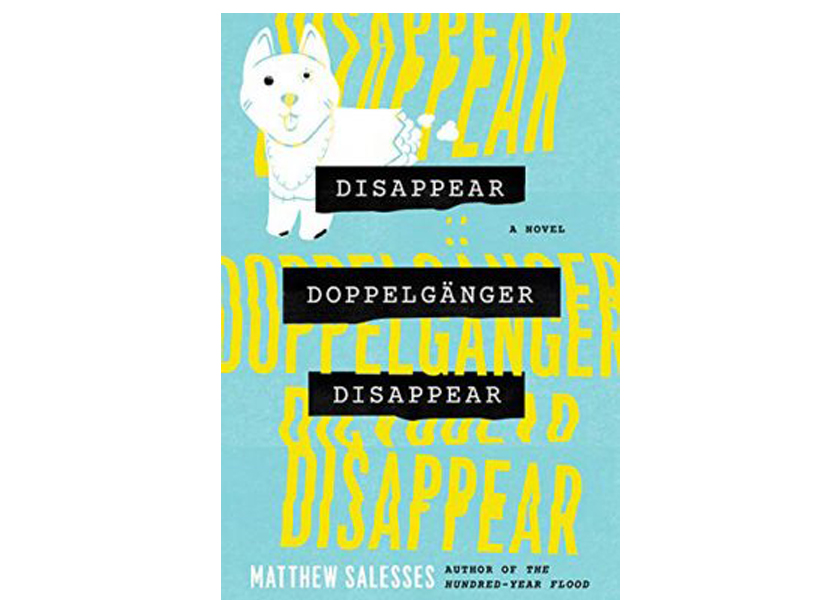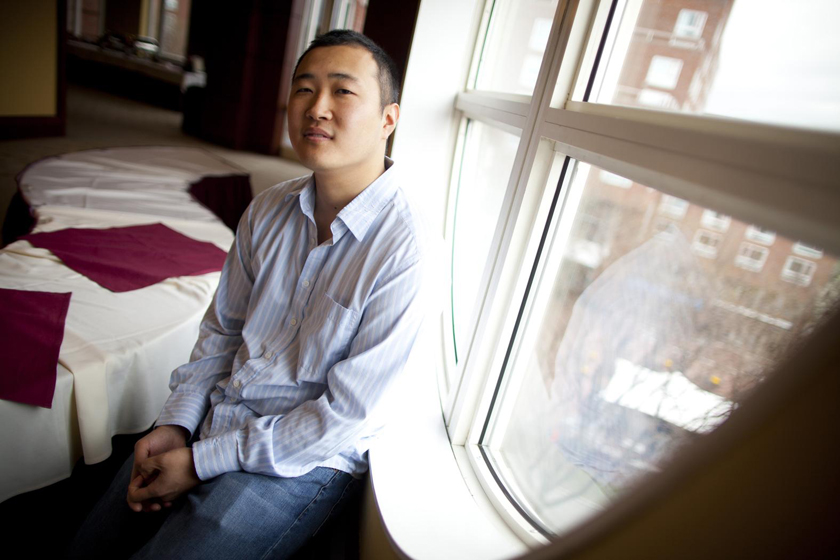Disappear Doppelganger Disappear ~ By Matthew Salesses
Little A Publications, Seattle, 2020 ISBN #978-1-5039-4326-1
Review by Bill Drucker (Spring 2020 issue)

For some people, life just sucks. For hapless Matt Kim, a Korean American loser by all accounts, life has become an existential crisis. He moves from place to place, and person to person feeling unacknowledged and unaccepted. He feels marginalized. More than being ignored and made insignificant, Matt sees himself as disappearing.
On the surface, Matt Kim is unremarkable, like anybody else. He has a girlfriend, Yumi, a nagging ex-wife Jenny and precocious daughter Charlotte, a job, a place. But all that feels tenuous, fleeting, and inconsequential as a series of surreal events come at him. Is it the world or is it him? As things become more dramatic, Matt attempts to find the answers, before he disappears all together.
Author Matt Salesses has written a clever story that doesn’t give the reader any straight answers. Instead, the unlikely and sometimes bizarre perspective of the unreliable narrator is only part of the puzzle, as other people with whom the narrator comes in contact sometimes corroborate and sometimes negate his view that a double reality is unfolding.
The novel is original; creative, darkly humorous, with dialogue that discusses personal existence and identity, and the individual’s roles and responsibilities in society. A Korean adoptee, Salesses has taken the idea of the Korean adoptee as a person from two places, with split nationality, identity, cultural background, and personality, and turned it upside-down.
Matt Kim tells his girlfriend Sandra, a bartender at the Cave, that he is disappearing. People are bumping into him as though they do not see him. She says he’s just depressed. Then she asks if he stopped by City Hall to get her named changed to Yumi. Sounds more Korean. No, he didn’t.
Matt didn’t do a lot of things lately. He did not meet commitments to his daughter. He has been out of touch with his adoptive parents. The common remark he hears is, “What’s the matter with you?” He spends too much time in his room, lost in self-pity. Everything is too hard for him to deal with.
The first of a string of surreal occurrences is seeing Sandra and Yumi as two separate people. They are either two Yumis or two Sandras, or perhaps a Yumi and a Sandra. The new Sandra shows Matt a picture of her boyfriend. His name is Matt and he has gone missing. The universe is playing some kind of cruel joke. According to Sandra, there is also another Matt.
Hiding in his room doesn’t help. Sleep does not help. He increasingly feels that he is dreaming or hallucinating. Unable to resist, Matt Kim moves into another reality. Or rather, a wall in his room opens up, and he walks in. What now, into the Twilight Zone?
The only reassuring thing is hearing Yumi’s voice. Then Matt wonders if it is really Sandra. She starts talking about doubles and doppelgangers. Matt takes comfort in the new Sandra. Then Yumi walks in. Another cruel joke. Then Yumi leaves and Sandra stays.
Matt has a job at Looking Glass, an aptly-named marketing firm. There is a co-worker named Tokki. Sounds like rabbit in Korean. The author humorously portrays this character as having two big rabbit teeth and munching on snacks when she thinks nobody’s looking. Tokki tells him that he looks like someone she knows, Matt Chung. Didn’t Sandra say he reminded her of a Matt? Is this the same Matt?
Matt then hears of a man who was at first missing then found dead of an apparent murder. His body is found chopped up and dumped in a dumpster, near Matt’s place. The neighbors tell police they suspect Matt Kim. Two police knock on his door. In the interrogation room, the two white cops and the Asian suspect play out the crime scenario. Matt makes the stupid remark that it was his fault. What, the murder? The murdered body is identified as a Matt. This is apparently the other Matt, Matt Chung. This Matt is described as a model minority, a marketing savant, a recipient of a top education, at top of his profession. Chung is, in Matt Kim’s estimation, the opposite of everything he is.
But all was not well with Matt Chung either, prior to his demise. His life was uneasy and anxious and he felt like he was going to die. Maybe it was the superstitious immigrant mindset. Or the apprehensions of racism and social indifference. Next, Matt tries to to get support from his friend, Matt Salesses.
Sandra tells Matt Kim to be Matt Chung, saying that is the only way to free himself. In the new reality, Matt was regains his equilibrium and resolves to go on. He makes a four-point bucket list: Become the other Matt; avenge the other Matt; change whatever circumstance lead Matt to un-Matt; and burn the murder/disappearance to the ground.
He visits his ex-wife Jenny and daughter Charlotte. As Matt Chung, he sees them differently. Jenny asks him to stay for breakfast. Matt begins to understand that he’s been a poor husband and father.
Matt just needed to complete his list. He finds Matt Chung’s family. The mother screams for Matt to get out her son’s body. A neighbor say he looks like a boy she knew named Matt. Somehow Matt Kim/Chung finds his way to the door of Matt Salesses for a final showdown.
Author Salesses deftly juggles the absurd with the serious throughout this novel. To be specific, the question of one’s existence, or in Matt’s case, the bane of his existence, is examined. The author balances ambiguity and ambivalence to keep both Matt and the reader guessing at the strange situations that unfold.
Similar to the fluid sense of reality in Chang Rae Lee’s earlier work Native Speaker, Salesses shows his skill in manipulation of the narrator in this story where an alternative reality is just a step away from humdrum day-to-day reality. In his choice of themes, Salesses also shows his sensitivity to the pulse of Asian American culture. As in Native Speaker, Salesses depicts an world where the character is completely familiar with, yet unable to completely accept, the mainstream experiences of his daily life. He exercises these views through Matt Kim in a series of surreal events that makes for engaging reading.
Author Matt Salesses’ award-winning novels included I’m Not Saying, I’m Just Saying (2012) and The Hundred Year Flood (2015).

Korean Quarterly is dedicated to producing quality non-profit independent journalism rooted in the Korean American community. Please support us by subscribing, donating, or making a purchase through our store.


